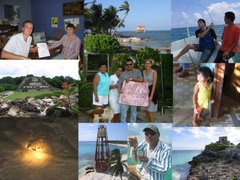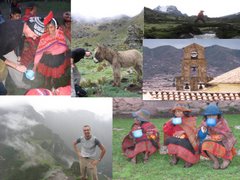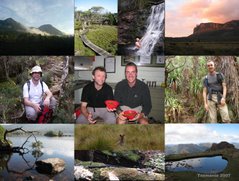
Beautiful Corozal district
On Thursday I saw the rehabilitation side of BCVI’s work for the first time. Evan, Joan Samuels (BCVI’s rehabilitation director), Shamira (the local rehabilitation officer), and I visited families and schools in Orange Walk district who look after disabled children. I think the issues we encountered were typical of the problems and challenges, and opportunities, facing the rehabilitation staff.
The first family that we visited seemed reasonably well off by Belize standards. There were four primary school-aged children in the family, including twin  girls, one of whom was blind. The children all seemed happy and a little curious about us, and in particular my laptop and camera. The blind girl kept a small bicycle with stabilizers in the house and as we sat with the parents, she brought the bike out into the living room. After a moment, she started to ride around the room, now and then making a very high pitched brrrrrrrr… noise, like a sort of alarm. Mrs Samuels told me that the child was using the echo to let her know where the walls and other obstacles were, and that she had learned to do this by herself, without any instruction. The little girl is 5 years old.
girls, one of whom was blind. The children all seemed happy and a little curious about us, and in particular my laptop and camera. The blind girl kept a small bicycle with stabilizers in the house and as we sat with the parents, she brought the bike out into the living room. After a moment, she started to ride around the room, now and then making a very high pitched brrrrrrrr… noise, like a sort of alarm. Mrs Samuels told me that the child was using the echo to let her know where the walls and other obstacles were, and that she had learned to do this by herself, without any instruction. The little girl is 5 years old.
Evan downloaded some Braille instruction materials onto the father’s computer. The father was very keen to get all the information he could. In particular he wanted to be sure not only that he had the basic Braille instruction material, but also the more advanced books on mathematics and science. Mrs Samuels explained that sometimes there can be a problem if parents or teachers are too keen. The child can end up feeling overwhelmed if they are expected to do too much before they have mastered the basics of working in Braille. But seeing the father’s enthusiasm was really encouraging.
After passing on the materials and arranging a repeat visit in a few weeks, we headed off. The second family lived in a much more modest house, similarly remote from the main towns in OW district. The boy has recently left school at age 15. He is blind but has a great attitude. BCVI are planning a project that will help him earn a living by rearing pigs at the family home. We went out into the small field at the back of their house where there is a well and a pen, which seemed very cramped for the two full-sized pigs inside. BCVI hope to work out a detailed plan that will allow the boy to manage all stages of the enterprise from piglets to fully grown pigs and to build proper accommodation for them, and ensure they have food and water. The boy seemed very enthusiastic about the project, and the pigs. The pigs looked rather unenthusiastic, and ill equipped for the intense heat. Sweating and panting, they lay like beached  whales, their dilated eyes staring into the heat.
whales, their dilated eyes staring into the heat.
Crispy Bacon
After this we visited two primary schools where we checked up on two girls with visual impairment. The first girl wore glasses but, even corrected, her vision still had limitations. We asked the headmistress how the girl was getting on. She seemed content with the girl’s progress at the school, focusing on the fact that she had ‘never complained of any problems’ in class. However, when pressed, the teacher conceded that the girl wasn’t making as much progress as her classmates, and though she never complained, this was probably more of a communication issue rather than a true reflection of the impact of her disability. Evan and I went to the classroom where Evan spoke to the girl and gave some advice to her teacher, advice which he hopes will better ensure that the girl is integrated into her classes.
Belize in October - so hot that the dogs sleep in ovens, just to cool down
In the second school the girl was a little younger, perhaps 6 or 7, and seemed to be less keen on playing with her classmates. She was quick to get upset even when Mrs Samuels simply asked her to come over to speak to her. At the same time, the girl’s teacher seemed very keen to learn more about how she could best help the girl. Later, we spoke to the headmistress. Both teachers seemed very positive about the policy of integrating the child into school life and had few doubts or concerns, even though this was the first blind child they had had at the school. Evan again gave some words of encouragement about the benefits of integration, which is still a new policy for many schools in Belize. Mrs Samuels told me after our visit that she felt that the girl’s discomfort and anger was perhaps due to her being spoiled. I guess this must be a common temptation for parents with disabled and blind children.
 Evan has the clients’ needs well covered
Evan has the clients’ needs well coveredThe third family were much more remote than the rest. We crossed into Corozal district via a hand-cranked ferry and drove for the best part of an hour on a heavily pot-holed and mud-caked road. When we got to the family home, which was very much more modest again. The mother lives there with her four young children, three of whom are disabled, one confined to bed. The other two disabled children were both playing in the kitchen and living room. They were blind and were unable to walk or support themselves.
I might have expected the children to be introverted or quiet, or to look unhappy, but they were anything but. They laughed and played and seemed completely happy and content. Mrs Samuels said they were always like that. I felt really moved to see them so happy, with so little.
 Windy Miller is disappointed to find that his holiday in Belize is just like being at home
Windy Miller is disappointed to find that his holiday in Belize is just like being at homeOutside, Evan showed me the wheelchairs the children had been using to get to school. The distance from the school to their house is about half a mile and the road between the two was appalling, as shown in the condition of the chairs. Both had parts missing, damaged wheels and broken footrests. I would have guessed that the wheelchairs had been shoved into this corner of the garden a long time ago, except that when I looked more closely I could see that they were
 in fact very new, the stitching in the back of the chairs clean and undamaged. Evan explained that the chairs were indeed nearly new but that the condition of the road was such that no wheelchair could be expected to last more than a couple of months.
in fact very new, the stitching in the back of the chairs clean and undamaged. Evan explained that the chairs were indeed nearly new but that the condition of the road was such that no wheelchair could be expected to last more than a couple of months.It was all the more disappointing that here were two children who had a fantastic attitude and had been given the resources that they were judged to have needed, but that those resources were going to waste. Evan is determined to do something about this though. He plans to put a proposal forward to buy a golf cart for the school, which the teachers could use in the morning to collect the two children. Evan posed as I took photographs of the state of the road outside the childrens’ home. Back in the house I took photos of Evan with the children. I also took a photo of their sister who sat quite calmly the whole time, like a little angel. These photos will help Evan put together a case for funding for this project.

On the way back, we spent quite a bit of time talking about the social issues that the rehabilitation staff encounter, social problems which are all the more visceral and unavoidable for staff due to BCVI’s policy of visiting their clients in their homes rather than relying on their clients coming to the health-care centres to visit them.
In many cases, BCVI’s work seems to be hampered by the behaviour or attitude of the parents and guardians of those that they are trying to help. It could be argued that the value of BCVI intervening is called into question in a situation where the parents aren’t helping, or appear to be actively making the situation worse. Mrs Samuels was very much of the view that, regardless of the attitude of the parents, BCVI had a responsibility to the children and, unless it was impossible, they should do what they could to try to help. Where difficulties have to be lived with, they have to be lived with, and worked around. One of the biggest lessons to be learned in working in rehabilitation is that you have to provide help on the clients’ terms. It’s no good BCVI staff trying to reach a particular goal and set of outcomes that they themselves have devised. Assistance can only ever be given in a way that fits with the client’s view of what is needed and wanted, though there may be a role for BCVI to play in trying to educate parents to appreciate the benefits to the children of BCVI’s assistance.
The trip was a real education. I came away with a lot of love for the children and strong feeling for what BCVI is doing. I also have a great deal of respect for BCVI’s rehabilitation staff and their approach to working with the children.
 Mangrove Swamp (not a German prog-rock group from the 70s)
Mangrove Swamp (not a German prog-rock group from the 70s)








2 comments:
I like the bit about the dogs sleeping in ovens to keep cool! Here in India I gave a friend from the UK a lift on my scooter. Afterwards he said that he had been looking forward to it because he thought it would be nice and cool, but that it had actually been like being in a fan assisted oven!
To think that India will be even hotter than this. I'm sweating just thinking about it.
Can't be too much tougher thatn this though. I checked the BBC weather website at lunchtime today and the current humidity reading for Belize City was... 100%.
I don't even know what that means...
Post a Comment